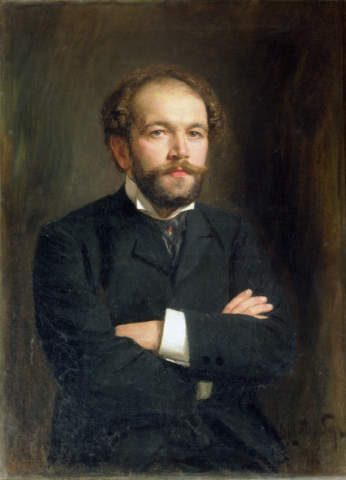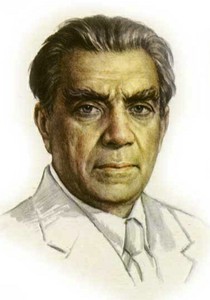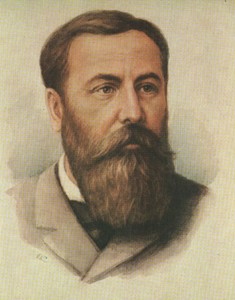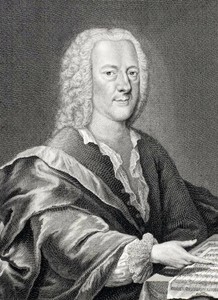
Nikolai Karlovich Medtner |
Nikolai Medtner
I’m finally in art limitless Reached a high degree. Glory smiled at me; I am in people’s hearts I found harmony with my creations. A. Pushkin. Mozart and Salieri
N. Medtner occupies a special place in the history of Russian and world musical culture. An artist of original personality, a remarkable composer, pianist and teacher, Medtner did not adjoin any of the musical styles characteristic of the first half of the XNUMXth century. Approaching partly to the aesthetics of the German romantics (F. Mendelssohn, R. Schumann), and from Russian composers to S. Taneyev and A. Glazunov, Medtner was at the same time an artist striving for new creative horizons, he has much in common with brilliant innovation. Stravinsky and S. Prokofiev.
Medtner came from a family rich in artistic traditions: his mother was a representative of the famous musical family Gedike; brother Emilius was a philosopher, writer, music critic (pseudo Wolfing); another brother, Alexander, is a violinist and conductor. In 1900, N. Medtner brilliantly graduated from the Moscow Conservatory in the piano class of V. Safonov. At the same time, he also studied composition under the guidance of S. Taneyev and A. Arensky. His name is written on the marble plaque of the Moscow Conservatory. Medtner began his career with a successful performance at the III International Competition. A. Rubinstein (Vienna, 1900) and won recognition as a composer with his first compositions (piano cycle “Mood Pictures”, etc.). The voice of Medtner, a pianist and composer, was immediately heard by the most sensitive musicians. Along with concerts by S. Rachmaninov and A. Scriabin, Medtner’s author’s concerts were events in the musical life both in Russia and abroad. M. Shahinyan recalled that these evenings “were a holiday for the listeners.”
In 1909-10 and 1915-21. Medtner was a piano professor at the Moscow Conservatory. Among his students are many later famous musicians: A. Shatskes, N. Shtember, B. Khaikin. B. Sofronitsky, L. Oborin used Medtner’s advice. In the 20s. Medtner was a member of the MUZO Narkompros and often communicated with A. Lunacharsky.
Since 1921, Medtner has been living abroad, giving concerts in Europe and the USA. The last years of his life until his death, he lived in England. All the years spent abroad, Medtner remained a Russian artist. “I dream of getting on my native soil and playing in front of my native audience,” he wrote in one of his last letters. Medtner’s creative heritage covers more than 60 opuses, most of which are piano compositions and romances. Medtner paid tribute to the large form in his three piano concertos and in the Ballad Concerto, the chamber-instrumental genre is represented by the Piano Quintet.
In his works, Medtner is a deeply original and truly national artist, sensitively reflecting the complex artistic trends of his era. His music is characterized by a feeling of spiritual health and fidelity to the best precepts of the classics, although the composer had a chance to overcome many doubts and sometimes express himself in a complicated language. This suggests a parallel between Medtner and such poets of his era as A. Blok and Andrei Bely.
The central place in the creative heritage of Medtner is occupied by 14 piano sonatas. Striking with inspirational ingenuity, they contain a whole world of psychologically profound musical images. They are characterized by the breadth of contrasts, romantic excitement, inwardly concentrated and at the same time warmed meditation. Some of the sonatas are programmatic in nature (“Sonata-elegy”, “Sonata-fairy tale”, “Sonata-remembrance”, “Romantic sonata”, “Thunderous sonata”, etc.), all of them are very diverse in form and musical imagery. So, for example, if one of the most significant epic sonatas (op. 25) is a true drama in sounds, a grandiose musical picture of the implementation of F. Tyutchev’s philosophical poem “What are you howling about, the night wind”, then “Sonata-remembrance” (from the cycle Forgotten Motives, op.38) is imbued with the poetry of sincere Russian songwriting, the gentle lyrics of the soul. A very popular group of piano compositions is called “fairy tales” (a genre created by Medtner) and is represented by ten cycles. This is a collection of lyrical-narrative and lyrical-dramatic plays with the most diverse themes (“Russian Fairy Tale”, “Lear in the Steppe”, “Knight’s Procession”, etc.). No less famous are 3 cycles of piano pieces under the general title “Forgotten Motifs”.
Piano concertos by Medtner are monumental and approach symphonies, the best of them is the First (1921), whose images are inspired by the formidable upheavals of the First World War.
Medtner’s romances (more than 100) are diverse in mood and very expressive, most often they are restrained lyrics with profound philosophical content. They are usually written in the form of a lyrical monologue, revealing the spiritual world of a person; many are devoted to pictures of nature. Medtner’s favorite poets were A. Pushkin (32 romances), F. Tyutchev (15), I. V. Goethe (30). In the romances to the words of these poets, such new features of chamber vocal music of the early 1935th century as the subtle transmission of speech recitation and the enormous, sometimes decisive role of the piano part, come out in relief, originally developed by the composer. Medtner is known not only as a musician, but also as the author of books on the art of music: Muse and Fashion (1963) and The Daily Work of a Pianist and Composer (XNUMX).
The creative and performing principles of Medtner had a significant impact on the musical art of the XNUMXth century. Its traditions were developed and developed by many prominent figures of musical art: A. N. Aleksandrov, Yu. Shaporin, V. Shebalin, E. Golubev and others. -d’Alheim, G. Neuhaus, S. Richter, I. Arkhipova, E. Svetlanov and others.
The path of Russian and contemporary world music is just as impossible to imagine without Medtner, just as it is impossible to imagine it without his great contemporaries S. Rachmaninov, A. Scriabin, I. Stravinsky and S. Prokofiev.
ABOUT. Tompakova





